measuring-and-tracking-success
They
say that if you can measure it, then you can improve it. In search
engine optimization, measurement is critical to success. Professional
SEOs track data about rankings, referrals, links, and more to help
analyze their SEO strategy and create road maps for success.
Recommended Metrics to Track
Although every business is unique, and every website has different
metrics that matter, the following list is nearly universal. Here we're
covering metrics critical to SEO; more general metrics are not included.
For a more comprehensive look at web analytics, check out Choosing Web Analytics Key Performance Indicators by Avinash Kaushik.
1. Search Engine Share of Referring Visits
Every month, keep track of the contribution of each traffic source for your site, including:
- Direct Navigation: Typed in traffic, bookmarks, email links without tracking codes, etc.
- Referral Traffic: From links across the web or in trackable email, promotional, and branding campaign links
- Search Traffic: Queries that sent traffic from any major or minor web search engine
Knowing both the percentage and exact numbers will help you identify
weaknesses and give you a basis for comparison over time. For example,
if you see that traffic has spiked dramatically but it comes from
referral links with low relevance, it's not time to get excited. On the
other hand, if search engine traffic falls dramatically, you may be in
trouble. You should use this data to track your marketing efforts and
plan your traffic acquisition efforts.
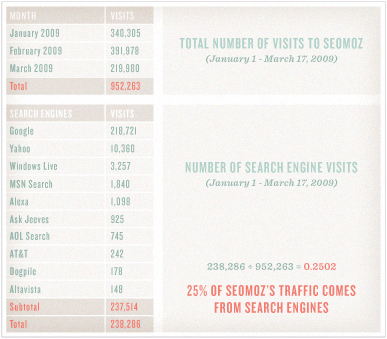
2. Search Engine Referrals
Three major engines make up 95%+ of all search traffic in the US:
Google and the Yahoo!-Bing alliance. For most countries outside the US,
80%+ of search traffic comes solely from Google (with a few notable
exceptions including Russia and China). Measuring the contribution of
your search traffic from each engine is useful for several reasons:
Compare Performance vs. Market Share
Compare the volume contribution of each engine with its estimated market share.
Get Visibility Into Potential Drops
If your search traffic should drop significantly at any point,
knowing the relative and exact contributions from each engine will be
essential to diagnosing the issue. If all the engines drop off equally,
the problem is almost certainly one of accessibility. If Google drops
while the others remain at previous levels, it's more likely to be a
penalty or devaluation of your SEO efforts by that singular engine.
Uncover Strategic Value
It's very likely that some efforts you undertake in SEO will have
greater positive results on some engines than on others. For example,
we've observed that on-page optimization tactics like better keyword
inclusion and targeting reap greater benefits with Bing and Yahoo! than
with Google. On the other hand, gaining specific anchor text links from a
large number of domains has a more positive impact on Google than the
others. If you can identify the tactics that are having success with one
engine, you'll better know how to focus your efforts.
3. Visits Referred by Specific Search Engine Terms and Phrases
The keywords that send traffic are another important piece of your
analytics pie. You'll want to keep track of these on a regular basis to
help identify new trends in keyword demand, gauge your performance on
key terms, and find terms that are bringing significant traffic that
you're potentially under-optimized for.
You may also find value in tracking search referral counts for terms
outside the top terms and phrases—those that are most valuable to your
business. If the trend lines are pointing in the wrong direction, you
know efforts need to be undertaken to course-correct. Search traffic
worldwide has consistently risen over the past 15 years, so a decline in
the quantity of referrals is troubling. Check for seasonality issues
(keywords that are only in demand certain times of the week/month/year)
and rankings (have you dropped, or has search volume ebbed?).
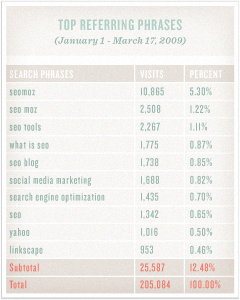
4. Conversion Rate by Search Query Term/Phrase
When it comes to the bottom line for your organization, few metrics
matter as much as conversion. For example, in the graphic to the right,
5.80% of visitors who reached Moz with the query "SEO Tools" signed up
to become members during that visit. This is a much higher conversion
rate than most of the thousands of keywords used to find our site. With
this information, we can now do two things:
- Checking our rankings, we see that we only rank #4 for "SEO
Tools." Working to improve this position will undoubtedly lead to more
conversion.
- Because our analytics will also tell us what page these visitors landed on (mostly https://moz.com/tools), we can focus our efforts on improving the visitor experience on that page.
The real value from this simplistic tracking comes from the
low-hanging fruit: finding keywords that continually send visitors who
convert to paying customers, and increasing focus on rankings and on
improving the landing pages that visitors reach. While conversion rate
tracking from keyword phrase referrals is certainly important, it's
never the whole story. Dig deeper and you can often uncover far more
interesting and applicable data about how conversion starts and ends on
your site.
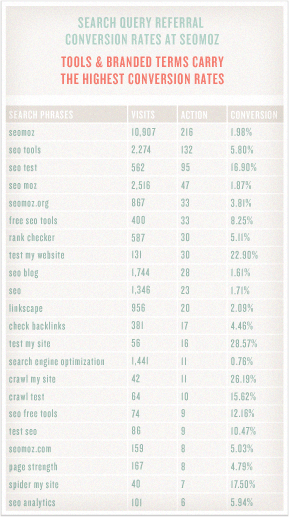
5. Number of pages receiving at least one visit from search engines
Knowing the number of pages that receive search engine traffic is an
essential metric for monitoring overall SEO performance. From this
number, we can get a glimpse into indexation—the number of pages from
our site the engines are keeping in their indexes. For most large
websites (50,000+ pages), mere inclusion is essential to earning
traffic, and this metric delivers a trackable number that's indicative
of success or failure. As you work on issues like site architecture,
link acquisition, XML sitemaps, and uniqueness of content and meta data,
the trend line should rise, showing that more and more pages are
earning their way into the engines' results. Pages receiving search
traffic is, quite possibly, the best long tail metric around.
While other analytics data points are of great importance, those
mentioned above should be universally applied to get the maximum value
from your SEO campaigns.
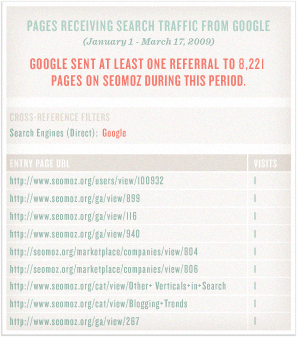
|
|
|
|
Google's (not provided) Keywords
In 2011, Google announced it would no longer pass keyword query data
through its referrer string for logged-in users. This meant that instead
of showing organic keyword data in Google Analytics, visits from users
logged into Google would show the keyword query as "(not provided)." At
the time, Google said they expected this to affect less than 10% of all
search queries. But soon webmasters reported up to 20% of their search queries were from keywords (not provided).
Over the ensuing two years, webmasters began reporting much higher
volumes of (not provided) keywords as more and more searched were
performed using encrypted search (i.e., the https:// version of Google).
With the launch of Google+, more logged-in users pushed this number
even higher. Over time, smart SEOs have identified methods to contend with the (not provided) situation, and tips on reclaiming your data. |
|
|
|
|
Analytics Software
The right rools for the job

- Moz Analytics
- Omniture
- Fireclick
- Mint
- Sawmill Analytics
- Clicktale
- Coremetrics
- Unica NetInsight
Additional Reading:
- How to Choose a Web Analytics Tool: A Radical Alternative from Avinash Kaushik way back in 2006 (but still a relevant and quality piece)

- Yahoo! Web Analytics (formerly Indextools)
- Google Analytics
- Clicky Web Analytics
- Piwik Open Source Analysis
- Woopra Website Tracking
- AWStats
Choosing can be tough. We're partial to Moz Analytics
because we built it from the ground up to provide the broadest suite of
SEO tools available, and give you all of your inbound marketing data in
one place. For free tools, our top recommendation is Google Analytics.
Because of its broad adoption you can find many tutorials and guides
available online. Google Analytics also has the advantage of
cross-integration with other Google products such as Search Console,
AdWords, and AdSense.
No matter which analytics software you select, we strongly recommend
testing different versions of pages on your site and making conversion
rate improvements based on the results. Testing pages on your site can
be as simple as using a free tool to test two versions of a page header
or as complex as using an expensive multivariate software to
simultaneously test hundreds of variants of a page.
Metrics for Measuring
Search Engine Optimization
It's difficult to optimize for specific behaviors of search engines,
because their algorithms aren't public. But a combination of tactics has
proven effective, and new data is always emerging to help track the
variables that influence ranking, and fluctuations in ranking signals.
You can even use the search engines themselves to gain a competitive
advantage by structuring clever queries and by utilizing data the
engines have published. You can employ what you learn from these
techniques, in concert with quality analytics software and SEO
education, to formulate an action plan for optimizing your website.


Google Site Query
Restrict your search to a specific site (e.g., site:moz.com).
Useful to see the number and list of pages indexed on a particular
domain. You can expand the value by adding additional query parameters.
For example, site:moz.com/blog inurl:tools, will show only those pages
in Google's index that are in the blog and contain the word "tools" in
the URL. This number will fluctuate, but it's a decent rough measurement
(learn more from this blog post).
Google Trends
At google.com/trends, you can research keyword search volume
and popularity over time. Log in to your Google account to get richer
data, including specific numbers instead of simple trend lines.
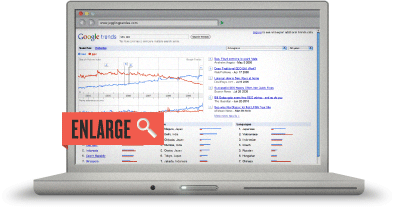

Bing Site Query
Restrict your query to a specific site (e.g., site:moz.com).
Just like Google, Bing allows for queries to show the number and list of
pages in their index from a given site. Be advised that Bing's counts
are given to considerable fluctuation, which may limit the utility of
the data.
Bing IP Query
Restrict your query to a specific IP address (e.g., ip:216.176.191.233).
This query will show pages that Microsoft's engine has found on the
given IP address. This can be useful to identify whether a page is
hosted on a shared provider, or to find sites hosted the same IP.
Bing Ads Intelligence
Bing Ads Intelligence
has a variety of keyword research and audience intelligence tools,
primarily intended for search and display advertising. This guide won't
dive deep into the value of each individual tool, but they are worth
investigating and many can be applied to SEO.

Blog Search Link Query
Search links in a blog (e.g., link:https://moz.com/blog).
Google's regular link query operator is not always useful, but their
blog search generally yields high-quality results, sortable by date
range and relevance. Learn more about the link operator in this blog post.

Page Specific Metrics
Page Authority - Page Authority predicts the likelihood that a
single page will rank well, regardless of its content. The higher the
Page Authority, the greater the potential for that individual page to
rank.
MozRank - MozRank, part of Moz's Open Site Explorer,
refers to Moz’s general, logarithmically scaled 10-point measure of
global link authority (or popularity). MozRank is very similar in
purpose to the measures of static importance (which means importance
independent of a specific query) that are used by the search engines
(e.g., Google's PageRank or FAST's StaticRank). Search engines often
rank pages with higher global link authority ahead of pages with lower
authority. Because measures like MozRank are global and static, this
ranking power applies to a broad range of search queries, rather than
pages optimized specifically for a particular keyword.
MozTrust - Another component of Open Site Explorer, MozTrust
is distributed through links. First, trustworthy seed sites are
identified to feed the calculation of the metric; these include major
international university, media, and governmental websites. Websites
that earn links from the seed set are then able to cast (lesser)
trust-votes through their links. This process continues across the web
and the MozTrust of each applicable link decreases as its distance from
the seed sites increases.
Number of Links - The total number of pages that contain at
least one link to a page, with a maximum of one qualifying link per
page. For example, if the Library of Congress homepage
(http://www.loc.gov/index.html) linked to the White House's homepage
(http://www.whitehouse.gov) in both the page content and the footer,
this would be counted as a single link.
Number of Linking Root Domains - The total number of unique
root domains that contain a link to a page, with a maximum of one
qualifying link per domain. For example, if topics.nytimes.com and
www.nytimes.com both linked to the homepage of Moz (https://moz.com),
this would count as a single linking root domain.
External MozRank - Whereas MozRank measures the link juice (ranking power) of both internal and external links,
external MozRank measures only the amount of MozRank flowing through
external links (links located on a separate domain). Because external
links can play an important role as independent endorsements, external
MozRank is an important metric for predicting search engine rankings.

Domain Specific Metrics
Domain Authority - Domain Authority predicts how well a web
page on a specific domain will rank. The higher the Domain Authority,
the greater the potential for an individual page on that domain to rank
well.
Domain MozRank - Domain-level MozRank (DmR) quantifies the
popularity of a given domain compared to all other domains on the web.
DmR is computed for both subdomains and root domains.
This metric uses the same algorithm as MozRank but applies it to the
domain-level link graph, a view of the web that only looks at domains as
a whole and ignores individual pages. Viewing the web from this
perspective offers additional insight about the general authority of a
domain. Just as pages can endorse other pages, a link that crosses
domain boundaries (e.g., from a page on searchengineland.com to a page
on https://moz.com) can be seen as an endorsement of one domain by
another.
Domain MozTrust - Just as MozRank can be applied at the domain level (Domain-level MozRank),
so can MozTrust. Domain-level MozTrust is like MozTrust but instead of
being calculated between web pages, it is calculated between entire
domains. New or poorly linked-to pages on highly trusted domains may
inherit some natural trust by virtue of being hosted on the trusted
domain. Domain-level MozTrust is expressed on a 10-point logarithmic
scale.
Number of Links - The quantity of pages that contain at least
one link to the domain. For example, if http://www.loc.gov/index.html
and http://www.loc.gov/about both contained links to
http://www.nasa.gov, this would count as two links to the domain.
Number of Linking Root Domains - The quantity of different
domains that contain at least one page with a link to any page on the
site. For example, if http://www.loc.gov/index.html and
http://www.loc.gov/about both contained links to http://www.nasa.gov,
this would count as only a single linking root domain to nasa.gov.
Applying That Data
Just knowing the numbers won't help unless you can effectively
interpret and apply changes to course-correct. Below, we've taken a
sample of some of the most common directional signals obtained by
tracking data points and offered suggestions on how to capitalize on and
respond to them.
Fluctuation
In search engine page and link count numbers
The numbers reported in "site:" and "link:" queries are rarely
precise, so we caution against getting too worried about large
fluctuations unless they are accompanied by traffic drops. For example,
on any given day, Yahoo! reports between 800,000 and 2,000,000 links to
the moz.com domain. Obviously, we don't gain or lose hundreds of
thousands of links each day, so this variability provides little
guidance about our actual link growth or shrinkage.
If drops in links or pages indexed coincide with traffic referral
drops from the search engines, you may be experiencing a real loss of
link juice (check to see if important links that were previously sending
traffic/rankings boosts still exist) or a loss of indexation due to
penalties, hacking, or malware. A thorough analysis using your own web
analytics and
Google's Search Console can help to identify potential problems.
Falling
Search traffic from a single engine

Identify the problem most likely to be the culprit and investigate.
Visit forums like Cre8asite, HighRankings, and Google’s Groups for
Webmasters for help.
|
|
|
|
- You're under a penalty at that engine for violating search quality or terms of service guidelines. Check out this post on how to identify and handle a search engine penalty.
- You've accidentally blocked access to that search engine's
crawler. Double-check your robots.txt file and meta robots tags and
review the Webmaster Tools for that engine to see if any issues exist.
- That engine has changed their ranking algorithm in a fashion
that no longer favors your site. Most frequently, this happens because
links pointing to your site have been devalued in some way, and is
especially prevalent for sites that engage in manual link building
campaigns of low-moderate quality links.
|
|
|
|
|
Falling
Search traffic from multiple engines
Chances are good that you've done something on your site to block
crawlers or stop indexation. This could be something in the robots.txt
or meta robots tags, a problem with hosting/uptime, a DNS resolution
issue, or a number of other technical breakdowns. Talk to your system
administrator, developers, or hosting provider, and carefully review
your Webmaster Tools accounts and analytics to help determine potential
causes.
Individual
Ranking fluctuations
Gaining or losing rankings for one or more terms or phrases happens
millions of times a day to millions of pages and is generally nothing to
be concerned about. Ranking algorithms fluctuate, competitors gain and
lose links (and on-page optimization tactics), and search engines even
flux between indexes (and may sometimes even make mistakes in their
crawling, inclusion, or ranking processes). When a dramatic rankings
decrease occurs, you might want to carefully review on-page elements for
any signs of over-optimization or violation of guidelines (cloaking,
keyword stuffing, etc.) and check to see if links have recently been
gained or lost. Note that with sudden spikes in rankings for new
content, a temporary period of high visibility followed by a dramatic
drop is common; in the SEO field, we refer to this as the "freshness
boost".
"Don't panic over small
fluctuations. With large drops, be wary against making a judgment call
until at least a few days have passed. If you run a new site or are in
the process of link acquisition and active marketing, these sudden
spikes and drops are even more common, so simply be prepared and keep
working."
Positive
Increases in link metrics without rankings increases
Many site owners assume that when they've done some classic
SEO—on-page optimization, link acquisition, etc.—they can expect instant
results. This, sadly, is not the case. Particularly for new sites,
pages, and content that have heavy competition, ranking improvements
take time. Even earning lots of great links is not a sure recipe to
instantly reach the top. Remember that the engines not only have to
crawl all those pages where you've acquired links, but also index and
process them. So the metrics and rankings you're seeking may be days or
even weeks behind the progress you've made.


Contributors
We would like to extend a very heartfelt thank you to all of the people who contributed to this guide, including Urban Influence













